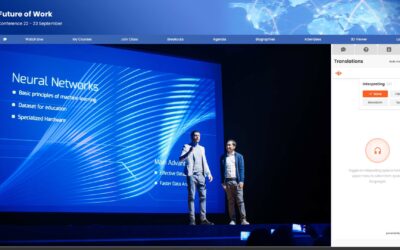What event trends to watch this year…
Over the last two years, all businesses and organisations were impacted by the Covid-19 pandemic. We have had to changed how we work, and this will influence us forevermore. The ongoing pandemic is easing, but some uncertainty remains. How should we, and how can we, plan business events and marketing activity moving forward?
Here is an overview of the key 2022 event trends to watch.
New technologies will continue to emerge
Event organisers and businesses alike have relied heavily on digital technologies to enable business to happen. The rise of new technologies has been crucial. This is only set to continue in 2022 and beyond as the gaps between ‘need to meet’ and ‘ability to meet’ have been bridged in creative ways.
In a recent analysis and discussion of event industry leaders, Kai Hattendrof, Managing Director of UFI, believes a full economic recovery of the event industry will take place by 2024, and that new digital technologies for the events sector will continue to play a crucial part in this recovery.
Event organisers and businesses have embraced new ways of doing things digitally and this technology is becoming increasingly valuable. Organisers are adopting a mix of in-person and online events.
The increased use of data is becoming commonplace. With this data comes the huge opportunity to create insight to design meaningful, powerful activities that deliver a strong and measurable ROI. It’s important that data policies, security, consent and privacy are considered, well planned and clearly communicated to all.

Hybrid Events are here to stay
The phenomenal developments in event technology means Hybrid events and Virtual events are now easy to navigate for attendees. No matter where attendees are located physically, they can move easily between in-person and virtual event experiences.
Socio CMO Andrew Pearson, who spoke at the Event 2022 Event Trends Summit said “Ultimately, the blending of the hybrid event experience means that hosting hybrid events becomes less about servicing two separate audiences and more about merging two types of technologies.”

Flexibility will drive confidence
Events are an essential part of most businesses overall marketing strategy, increasing awareness, generating sales and building trust. The uncertainty of the ‘stop start’ approach of recent years can be reduced with digital and event technologies that support delivery of all types of events, even in times of change. The flexibility provided by Hybrid and Virtual experiences allows organisers the flexibility they need when it comes to dates, in-person venues, content and speakers.
On demand content is king
On demand content is recorded and hosted post event for attendees to view at their leasure. This is a great option for a variety of situations, including reaching audiences across different time zones. Content can be quickly distributed directly to the audience who may be working from home, in the office or on the move.
Content is the main driver of engagement at events of all types and investing in skills, resources and technology to provide on demand content is set to become a priority for many organisations.

Data insights create engaging educational content
Recent developments have created an excellent opportunity to repurpose content from in-person and Virtual events, and to use this elsewhere. Year-round engagement, learning and education is easier to do today than it’s ever been, and many flourishing businesses are taking advantage of the content they create to educate others at different times. Professional development training, eLearning pre and post event allow large and decentralised audiences to benefit and learn.
“Regardless of event format, engagement is the metric that can predict the outcome of an event” says Hopin’s VP of Marketing Strategy and Events Julius Solaris.
User data made available from Virtual and Hybrid events means attendees can be recommended personalised content. Data driven insights, and improvements will help event organisers engage audiences like never before, improving job performance and career progression.

Hybrid workforces
Hybrid working has its’ challenges. Companies are beginning to understand more about the technologies available to them, and what works best for their business and culture. Well delivered Hybrid working practices can have a positive impact. Hybrid working technologies can improve collaboration, inclusivity and communication amongst teams as well as individuals and organisations as a whole.
To find out how Procreation can help your business create experiences that embrace today’s technologies and exceed audience expectations, get in touch today.
Book a time with one of our team to discuss your next project
More insights from the Procreation blog
Procreation and Interprefy partnership
Procreation are delighted to announce their new...
Unmissable features for Virtual Events: Network Café
Virtual Event Feature spotlight - Networking...
Gen Z in the workplace: what you need to know
Gen Z – the next generation of workers Gen Z is...




